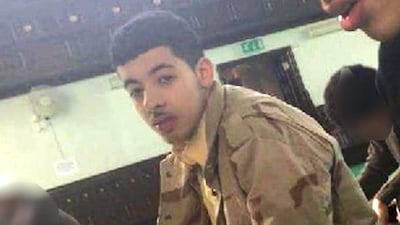Political correctness is allowing Islamist extremists to operate “under the radar” in a “blind spot”, Britain's Home Secretary has said.
Speaking at a counter-extremism conference on Wednesday, Suella Braverman said the entire concept of political correctness should be scrapped.
“We have a blind spot in the system. It has allowed certain Islamist groups to operate under our radar,” she said, in an excerpt of her speech which was obtained by The Times.
“There can be no place for political correctness in our national security. In fact, I'd like to banish it altogether.”
Her comments came ahead of the release on Thursday of the third and final report from a public inquiry into the Manchester Arena bombing.
Twenty-two people were killed and hundreds were injured in a suicide attack at the end of an Ariana Grande concert on May 22, 2017. Evidence into the circumstances leading up to and surrounding the atrocity was heard in the city between September 7, 2020 and February 15, 2022.
Ms Braverman was speaking at an event organised by Robin Simcox, the commissioner for countering extremism.
In another excerpt from her speech, Ms Braverman flagged concerns over “non-violent extremism”.
“Extremism is not only dangerous because it can lead to violence”, she said.
“It is dangerous in its own right. And unless we deal with it comprehensively, we should not be surprised when it continues to endure and grow — with disastrous consequences.”
The Home Secretary will receive the report into the Manchester bombing on Thursday, following the inquiry which was led by Sir John Saunders.
The report is set to answer whether the terror attack by Salman Abedi could have been prevented by MI5 and counter-terrorism police.
It will also focus on the radicalisation of Manchester-born Abedi, 22, of Libyan descent, and the planning and preparation of the attack.
In March 2014, Abedi became a Subject of Interest (SOI) for MI5 over his phone contact with another SOI, but his case was closed four months later when he was deemed “low risk”.
The inquiry was told that from December 2013 to January 2017 Abedi was identified as being in direct contact with three SOIs — one suspected of planning travel to Syria, one with links to Al Qaeda, and the third with links to Libyan extremists.
And between April 2016 and April 2017, he was identified as a second-level contact — a contact of a contact — with three more SOIs, all with suspected links to ISIS.
In the months before the attack, two pieces of intelligence were received by MI5 about Abedi but assessed at the time to relate to possible non-terrorist criminality.
Both pieces of information were not passed to police and a review found in retrospect they could be seen to have been highly relevant to the planned attack.
Abedi's name also hit a “priority indicator” during a separate “data-washing exercise” as falling within a small number of former SOIs who merited further consideration.
A meeting to consider the results was scheduled for May 31, 2017, nine days after the bombing.
During the inquiry, a number of MI5 witnesses — including a senior officer known as Witness J — and detectives from North-West Counter Terrorism Police gave evidence behind closed doors.
The sessions were secret so as not to compromise national security and the inner workings of MI5 and counter-terror police.
A summary of some of the evidence was later made public, but did not reveal any further details about the intelligence received by M15 in the months before the attack.
The first inquiry report from retired high court judge Sir John Saunders, issued in June 2021, focused on security arrangements at the venue. It highlighted a string of “missed opportunities” to identify Abedi as a threat before he walked across the City Room foyer and detonated his shrapnel-laden device.
The second report last November delivered scathing criticism of the emergency services' response to the bombing.
Manchester bombing — in pictures
Sir John ruled that care worker John Atkinson, 28, would probably have survived but for the failures on the night, while there was a “remote possibility” the youngest victim, eight-year-old Saffie-Rose Roussos, could have lived with different treatment and care.
His findings and recommendations on radicalisation and its preventability will be published at 2pm on the inquiry website.
The report comes after a long-awaited review of Prevent, published last month, recommended an overhaul of the anti-terror strategy, which seeks to stop people becoming terrorists or supporting terrorism both in the UK and overseas.
Led by ex-Charity Commission chairman William Shawcross after being ordered by former home secretary Priti Patel in 2019, the assessment found Prevent was “out of kilter with the rest of the counter-terrorism system, and the UK terrorism threat picture”, and “must return to its overarching objective: to stop individuals from becoming terrorists or supporting terrorism”.
He said terrorism was wrongly treated as a mental illness, and there was a “failure” by those working on Prevent to properly understand the nature of ideology in Islamist radicalisation, which risks “several potentially serious consequences”.













